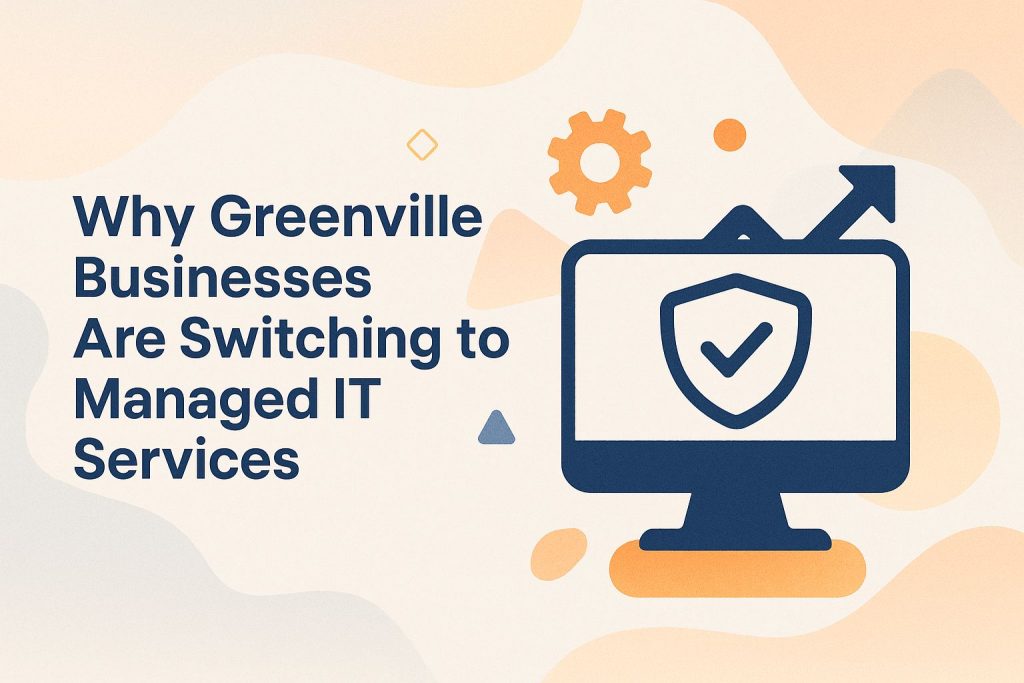Managed IT Services in Greenville: A Guide to Choosing Right

Today, managed IT services are essential for businesses. They help maintain competitiveness and efficiency. This article explains managed IT. It highlights its importance and key factors for choosing a provider. It discusses how to evaluate experience, expertise, and customer support. It also guides readers on questions to ask providers. The article provides practical tips. These help businesses find the right managed IT partner for their needs.
Understanding Managed IT Services
Managed IT services are a set of technology solutions. They help businesses with IT support, cybersecurity, cloud solutions, and network services.
In Greenville, local IT companies provide many services. These services enhance IT infrastructure. They include managed security services and software solutions. This allows organizations to focus on growth. They can trust qualified IT specialists to manage their technology as mentioned in our analysis of IT Security Services in Greenville.
Managed IT services also support network management, data backup, compliance, and monitoring. These are critical for business continuity today.
What is Managed IT and Why is it Important?
Managed IT means outsourcing IT management to an external IT solutions provider. This ensures dedicated support for various technology needs through service-level agreements (SLAs). This approach is vital for organizations that want a strong IT strategy. It helps oversee IT governance and align with business objectives.
By leveraging managed IT services, companies can access many specialized solutions. These include network monitoring, data security, cloud services, business intelligence, and helpdesk support.
These components are essential for enhancing operational efficiency and maintaining a competitive edge in today’s digital landscape. Effective IT management helps businesses minimize downtime and reduce risks from technology failures.
Service differentiation is important. Providers can customize their services to meet business needs. This helps organizations adapt quickly to market changes while adhering to their established SLAs and IT policies.
Factors to Consider when Choosing a Managed IT Provider
Selecting the appropriate managed IT provider is crucial for businesses, as it has a direct impact on operational efficiency, IT performance, and overall service quality.
Organizations should evaluate potential IT providers meticulously, considering factors such as their experience, available IT resources, and the breadth of services offered, which may include IT consulting, vendor management, IT audits, and support for business continuity initiatives.
A strong partnership with a capable IT provider can enhance productivity, improve response times, increase client satisfaction, and support strategic partnerships in today’s technology-driven environment.
Experience and Technical Expertise
When evaluating a managed IT provider, the experience and technical expertise of their IT specialists play a crucial role in determining service quality and the effectiveness of managed services. A provider with a proven track record in IT evaluation and management is more likely to comprehend the specific business needs and technology trends pertinent to the industry.
This understanding not only facilitates better technical support but also enhances the alignment of technological solutions with strategic business goals. A seasoned provider can swiftly adapt to evolving challenges, ensuring that businesses remain agile and competitive in a rapidly changing landscape.
Their extensive exposure to various projects enables them to offer tailored advice, anticipate potential pitfalls, and implement best practices that mitigate risks.
Ultimately, such expertise fosters a partnership in which clients can confidently rely on the provider’s insights, leading to smoother operations, responsive service, and improved overall performance.
Services Offered by Managed Services Provider

The services offered by a managed IT provider are crucial. They help meet an organization’s technology needs.
Key services include cloud solutions, cybersecurity, remote monitoring, and IT optimization. These help businesses operate securely and efficiently.
Providers integrate cloud solutions. This helps organizations scale resources easily and manage costs effectively. Cybersecurity measures are critical for protecting sensitive data and infrastructure from emerging threats, establishing a comprehensive defense strategy.
Additionally, remote monitoring solutions grant businesses continuous oversight of their IT systems, facilitating prompt intervention for any anomalies before they escalate into costly disruptions.
IT optimization services enhance existing processes, improving performance and reliability. Together, these offerings not only strengthen operational effectiveness but also contribute to overall business success by aligning technology strategies with organizational goals.
Customer Support, Communication, and IT Training
Customer support and communication are vital for a successful managed IT partnership. They directly affect user experience and satisfaction. A provider that emphasizes responsive help desk support and effective incident response can significantly improve service continuity and operational efficiency.
These elements build trust. They also help clients use the provided technology solutions fully. When users face issues, timely and clear communication becomes crucial to ensure that problems are resolved swiftly, thereby minimizing downtime.
A proactive support model, characterized by regular check-ins, feedback mechanisms, and incident response strategies, can help identify potential challenges in advance, further improving client relations.
The effectiveness of incident resolution depends on how clearly the provider articulates solutions and maintains open communication. This reinforces the importance of customer service in fostering satisfaction and loyalty among clients.
Cost, Budget, and IT Sustainability
When choosing a managed IT provider, organizations must evaluate costs and budgets. This ensures a cost-effective partnership that aligns with business goals. Good IT outsourcing strategies can save money. It’s crucial to understand how service differences impact overall value and efficiency.
This evaluation involves examining not only the pricing models offered by potential providers but also the breadth and depth of services they can deliver, including cybersecurity, data management, and technical support. A well-structured IT budget should encompass both immediate expenditures and long-term investments in technology upgrades.
Organizations should assess how the provider’s pricing affects service scalability, technology adoption, and integration as needs change.
By making informed financial decisions, organizations can optimize their resource allocation, enhance their overall IT infrastructure, business IT strategy, and improve service delivery without compromising quality.
Questions to Ask Potential Managed IT Providers for Vendor Evaluation
When partnering with a managed IT provider, asking the right questions is essential. It helps understand the benefits and risks, including IT compliance and service optimization.
Inquiries related to IT consulting capabilities, service quality, risk management strategies, IT governance practices, and virtual CIO services can provide critical insights into a provider’s ability to effectively address specific business requirements.
Key Inquiries for Making an Informed Decision on IT Strategy

To choose a managed IT provider, ask key questions about their assessment processes and technology. Understanding how managed services fit with existing systems and the details of SLAs is essential for evaluating compatibility.
Examine the provider’s scalability. Check if they offer tailored solutions that grow with your business. It is also crucial to assess the provider’s experience in managing similar environments and to understand their methods for ongoing performance monitoring and improvement.
Evaluating the provider’s responsiveness during critical situations, along with the benchmarks established within SLAs, will provide insight into their commitment to delivering quality service. Additionally, analyzing feedback from other clients can offer valuable insights into the provider’s reliability and support channels, ensuring that organizations make a robust choice that aligns with their strategic goals.
Tips for Choosing the Right Managed IT Provider
Choosing the right managed IT provider is crucial. It affects your IT landscape and performance.
Businesses should carefully consider various factors, including the provider’s capacity to deliver effective IT solutions, their performance monitoring capabilities, and the quality of technical IT support provided, including IT governance and system integration.
This evaluation ensures IT aligns with your business goals and prepares for crises.
Frequently Asked Questions
What should I look for when choosing a managed IT provider in Greenville for IT infrastructure and telecommunications?
When choosing a managed IT provider in Greenville, it is important to consider their experience, certifications, and customer reviews. You should also look for a provider that offers IT consulting, help desk services, and has a proactive approach to IT management and IT strategy.
What are the benefits of using a managed IT provider in Greenville for IT effectiveness?

A managed IT provider offers benefits like increased efficiency, better security, and lower IT costs. They can also offer proactive support, IT outsourcing, strategic planning, and resource management for your IT needs.
How do I know if a managed IT provider in Greenville is reliable with IT audits and IT performance metrics?
Research a provider’s track record, including client retention and response times for IT issues. Consider their performance metrics and IT project management capabilities. You can also ask for references from current or past clients.
What kind of IT support and network security can I expect from a managed IT provider in Greenville?
Expect 24/7 IT support, including remote and end-user assistance. They should also provide proactive IT maintenance and monitoring to prevent problems before they occur. Additionally, they should offer strategic planning, software licensing, and regular communication to align your IT needs with your business goals.
How can a managed IT provider in Greenville help my business grow with IT scalability and technology planning?
A managed IT provider helps your business grow with efficient, secure IT solutions, allowing you to focus on your core business goals with IT scalability. They can also offer strategic guidance, IT sustainability, and technology recommendations to help your business stay competitive and adapt to changing market trends.
What makes a managed IT provider in Greenville stand out from others in terms of innovation management and industry standards?
A provider stands out by offering personalized IT management and excellent customer service, and staying up-to-date with the latest IT innovations and trends. They may also have a strong reputation, managed services contracts, and positive customer reviews in the local business community.




